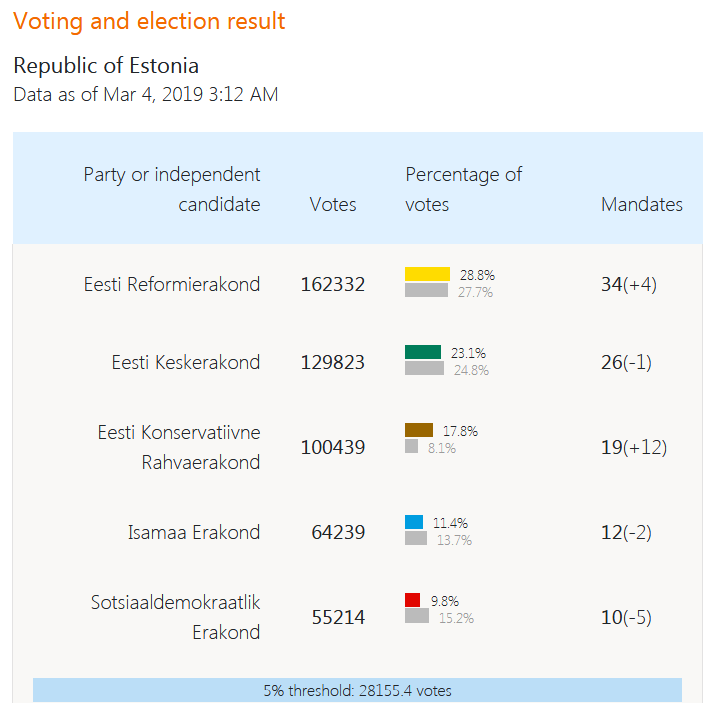Estonia. Vince la destra. Ekre prende 19 deputati (+12).
Giuseppe Sandro Mela.
2019-03-04.

Eesti Reformierakond ha ottenuto il 28.8% dei voti e 34 seggi, aumentando di 4, mentre Eesti Keskerakond ha ottenuto il 23.1%, conseguendo 26 deputati, uno in meno della passata legislazione.
Eesti Konservatiivne Rahvaerakond ha ottenuto il 17.8% dei suffragi, conquistandosi 19 deputati, dodici in più che nelle scorse elezioni.
«The opposition centre-right Reform party has won Estonia’s general election, beating the ruling Centre»
*
«Reform, led by former MEP Kaja Kallas, took about 29% of the vote to 23% for Centre in Sunday’s ballot.»
*
«Meanwhile the far-right Conservative People’s Party of Estonia (EKRE), which has called for a referendum on EU membership, came a close third»
*
«Ms Kallas – set to be Estonia’s first female prime minister – said all coalition options were on the table. Speaking to public broadcaster ETV however she insisted EKRE were “not a choice for us”»
* * * * * * *
I risultati di queste elezioni politiche rovesciano la situazione estone, che sembrerebbe avviarsi ad un governo di centro-destra.
Sicuramente dovrà essere concordata una coalizione governativa, per cui il programma finale di governo è ancora da determinarsi.
I due partiti tradizionali hanno annunciato in campagna elettorale di essere indisponibili a formare un governo con l’Ekre, gli identitari sovranisti estoni, ma in politica tutto è possibile.
* * * * * * *
Il voto estone conferma il trend che oramai caratterizza l’Europa: il corpo elettorale sta abbandonando i partiti liberal socialisti.
Non solo.
Se sicuramente i partiti tradizionali potranno ostracizzare l’Ekre, lasciandolo in una sorta di ghetto, d’altra parte ben difficilmente potranno non tener conto della sua presenza politica e delle sue istanze. Poi, come in queste elezioni l’Ekre ha saputo conquistarsi 19 seggi, mica è detto che alle prossime elezioni consegua la maggioranza.
Né, tanto meno, è detto che in Estonia non si attuino anche manifestazioni di piazza tipo quelle dei Gilets Jaunes in Francia.
Il mondo politico europeo sta cambiando, e questi sono i primi segni della mutazione.
TALLINN, 3 MAR – L’opposizione di centrodestra si profila come la vincitrice delle elezioni parlamentari in Estonia, dove si registra anche una forte avanzata dei populisti di destra.
Mentre lo scrutinio è quasi terminato, il Partito Riformista, di stampo ultra-liberista, che ha guidato il Paese dal 2005 al 2016 si attesta al 34%, mentre il Partito Centrista dell’attuale premier Juri Ratas – perno di una coalizione con 2 partiti minori, Socialdemocratici e conservatori di Fatherland, dal 2016 – raggiungerebbe il 26%. Il Partito Conservatore del Popolo Estone (Ekre), che si è presentato al voto con un’agenda anti-immigrazione, avrebbe il 19% (avevano l’8,1% nel 2015). I 2 principali partiti hanno sempre detto che nessuna alleanza sarà possibile con Ekre, ma il presidente di quest’ultimo, Mart Helme, si è detto disponibile ad entrare in una coalizione.
L’Estonia ha una popolazione di 1,3 milioni di abitanti, e circa un milione di elettori. L’affluenza è stata del 62,1%.
The opposition centre-right Reform party has won Estonia’s general election, beating the ruling Centre.
Reform, led by former MEP Kaja Kallas, took about 29% of the vote to 23% for Centre in Sunday’s ballot.
Meanwhile the far-right Conservative People’s Party of Estonia (EKRE), which has called for a referendum on EU membership, came a close third.
Ms Kallas – set to be Estonia’s first female prime minister – said all coalition options were on the table.
Speaking to public broadcaster ETV however she insisted EKRE were “not a choice for us”.
Nearly a quarter of Estonia’s 881,000 eligible voters cast their ballots by e-voting. Results from e-voting gave Reform an even higher score.
Estonia uses proportional representation to pick members in its 101-seat parliament.
What were the results?
The decisive result came despite opinion polls suggesting in advance that the vote would be tight.
Reform and Centre have alternated in power since the Estonia’s independence from the Soviet Union in 1991.
But the eurosceptic EKRE saw its popularity surge, more than doubling its previous election results and garnering about 18% of the vote.
During campaigning the party pushed anti-immigration rhetoric and promised to slash taxes.
The two main parties support continued austerity policies, which have left Estonia with the lowest debt level of any Eurozone country but have caused anger in rural communities who feel left behind.
The conservative Isamaa party and the Social Democrats – currently in the governing coalition with the Centre party – won 11.4% and 9.8% respectively, and could partner with either of the main parties.
Centre and Reform have governed in coalition in the past. Ms Kallas did not rule this out again but said her party has “strong differences” with Centre over tax, education and citizenship.
PM Juri Ratas told ETV that Centre would consider being the junior coalition partner, but did not give details.
What were the main issues?
Reform and Centre campaigned on tax changes, the former to help job creation and the latter to boost state revenues.
Estonia’s Russian minority, who make up a quarter of the population, were also a key issue in the campaign.
The Centre party wants to maintain the joint Estonian- and Russian-language school system – something both Reform and EKRE plan to abolish.

Nessun commento:
Posta un commento